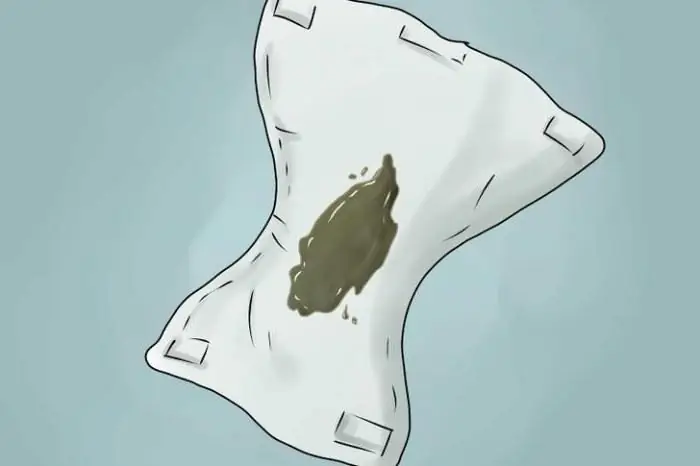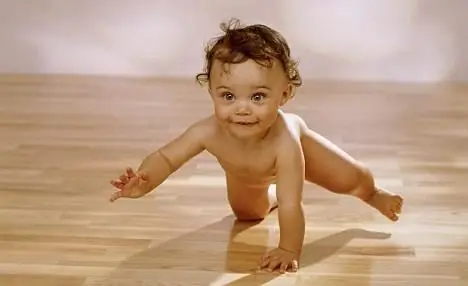2026 Author: Priscilla Miln | miln@babymagazinclub.com. Last modified: 2025-06-01 05:14:29
For young parents, there is nothing more interesting than to follow the development and growth of their baby. His first smile, steps, words will remain in the memory of mom and dad forever. Many new parents sooner or later wonder at what age children begin to crawl.

After all, from now on, the baby will be able to move independently around the apartment, exploring new objects and the space around.
I would like to note that some babies skip the crawling period altogether. They sit confidently enough, and then start walking immediately. Each child develops differently, so there can be no unequivocal answer to the question of at what age children begin to crawl. This usually happens at six to nine months. To make it easier for young parents to assess the growth rate of their baby, we suggest studying the main indicators that characterize the development of the crumbs by months. Indeed, in the first yearof a person's life, mental, emotional and physical data are actively formed.
Stages of child development up to a year
1 month
During this period, the formation of the bone, digestive, circulatory, urogenital and other body systems takes place. At this age, the baby in an upright position can hold its head for a short time. In response to a sudden movement, the newborn reflexively clenches his fists, spreads his arms to the sides or steps over his legs.

2 months
The development of a young child in the second month of life suggests a response. Hearing the conversation, he can turn his head in the right direction, follow the moving toys. While on the stomach, the baby can slightly raise the chest and head.
3 months
Some babies are already able to roll over on their side, change their body position. They actively reach for the toy, love to be played with or talked to. In three-month-old babies, when communicating with their mother, there is a “complex of revival”, the child hums, smiles, and actively moves.
4 months
A baby at this age already rolls over on his stomach without any problems and, being in this position, rises slightly. He actively grabs small objects and holds them in his hand. Can play with toys hanging over the crib.
5 months
With the support of an adult, the baby sits down, but it is still difficult for him to hold the back. It rests well on its legs if you hold it by the armpits. At five months old, babiesthey recognize their mother's voice and become wary of strangers.

6 months
The first half of the life of the crumbs behind. And caring parents are interested: at what age do children begin to crawl? Some babies, lying on their stomachs, are already beginning to make their first attempts at independent movement. Later, they may even get on all fours and sway. But for now, tearing the stomach off the floor is very problematic for them. At this age, children pronounce their first syllables and begin to sit on their own.
7 - 9 months
That's the age at which babies start to crawl, moving around the apartment. Sitting, the kids confidently straighten and tilt the torso. With the support of the hands, the children step over the legs. They are already trying to clap, their facial expressions are becoming more diverse. Toddlers play with rattles for a long time, tapping, throwing, examining them. Children of this age already stand up on their own, holding onto a support.
10 - 12 months
The kid is well oriented in the apartment, knows the names of some items. He begins to imitate the movements of mom and dad (opens boxes, throws a ball, etc.). At 12 months, the baby takes independent steps and even performs quite complex tasks: brings toys, opens the door, etc.
Recommended:
What time do boys start crawling: age norms, the appearance of crawling skills, features of the boy's development

Is it true that girls and boys develop differently? Yes, it's true, and the female sex develops faster than the male. According to statistics, girls quickly begin to sit and crawl, walk. But still, gender does not play a special role in physical development, and doctors do not pay attention to whether a boy or a girl is in front of them, but are guided by general data. The ability to crawl and sit independently also depends on the weight, on the development of the baby
Green poop in babies. Why do babies have green poop?

Various analyzes are the only way to get maximum information about pathological processes in the body. One of the most obvious and accessible for diagnosing children's tests is the study of bowel movements, so it is not surprising that many mothers, like doctors, are interested in why the baby has green poop, whether this is a problem or not
What time does baby start crawling? Let's find out

What time does baby start crawling? This is the question every parent asks themselves when their baby is born
At what age do babies start holding their heads. Tips for new parents

This article will help young parents find out at what age the child will be able to hold his head on his own, and give advice on how to help him with this
Is it true that some babies are born with teeth? Are babies born with teeth?

The birth of a child is always a long-awaited event for every woman. As practice shows, more than 2000 children are born annually with teeth, or they erupt in the first 30 days of life. Despite this, many parents are concerned about whether this is considered the norm

